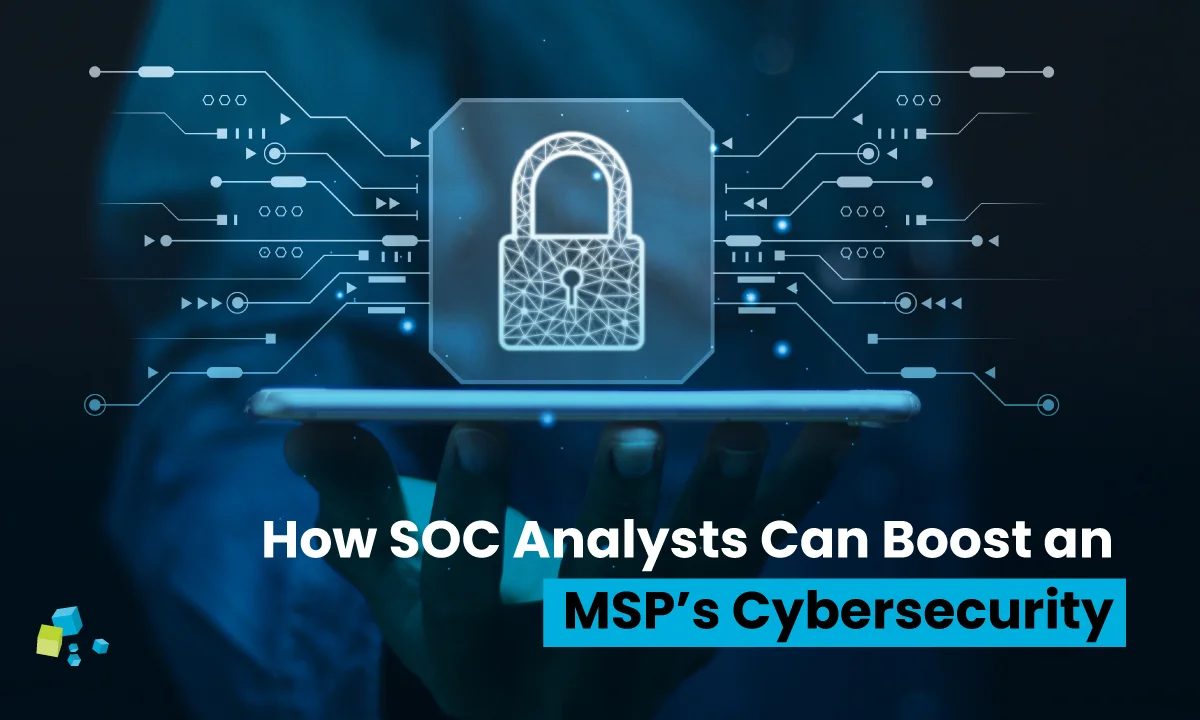Organizations often rely on specialized teams to monitor their digital data and protect against cybersecurity threats or attacks. These experts bring advanced technical knowledge and a keen ability to conduct diverse analyses, ensuring robust cybersecurity measures.
In this blog, we’ll delve into how SOC analysts can significantly enhance your MSP business’ cybersecurity posture, utilizing their expertise to prevent, detect and resolve cyberthreats efficiently.
What is an SOC analyst?
An SOC analyst is a person who monitors, evaluates and resolves security risks. Preventing network assaults is the primary objective of SOC analysts. They watch for indications of an assault on the network. They work with other team members to examine attacks after they are identified.
What does an SOC analyst do?
An SOC analyst is crucial for monitoring and securing systems and networks for your MSP business. The team of SOC collaborates with various departments to ensure comprehensive security and resolve any IT-related issues.
The key responsibilities of SOC analyst include:
- Surveillance of networks and systems: Monitor customers’ IT infrastructure, including security systems, applications and networks, for irregularities indicating breaches or attacks.
- Identifying and mitigating security threats: Detect and analyze threats in real-time, working with the MSP’s team to prevent recurrence and ensure client security.
- Incident response and investigation: Investigate incidents for MSP customers, collaborate with law enforcement if needed and report findings to prevent future incidents.
- Collaborating on security procedures: Work with MSP team members to implement and update security procedures and systems for customers.
- Staying updated on security threats: Continuously educate themselves on the latest cyberthreats and malicious actors to act swiftly on potential issues affecting clients.
- Participating in security audits: Assist in security audits for customers to identify and address vulnerabilities before exploitation.
What are the different levels of SOC analysts?
SOC analysts roles within the MSP context are divided into three tiers, each with specific responsibilities and expertise.
Tier 1: Junior security analysts
Responsible for monitoring client systems, responding to alerts and conducting triage operations. They also scan for vulnerabilities and manage monitoring tools.
Tier 2: Intermediate security analysts
These analysts decide the best response to cyberattacks, assessing the scope of issues escalated from tier 1 and initiating recovery processes.
Tier 3: Senior security analysts
Focused on proactive threat hunting, they identify vulnerabilities, study emerging trends, and develop new solutions to counter threats, ensuring advanced protection.
Things to consider while building an effective SOC analysts team
Building an effective SOC analysts team within your MSP business or partnering with an SOC support provider requires careful planning and consideration to ensure robust cybersecurity for your customers.
Define clear roles and responsibilities:
- Establish a tiered structure with clear roles for Tier 1, Tier 2 and Tier 3 analysts to ensure a streamlined response process.
- Assign specialized roles for threat intelligence, incident response, compliance and forensic analysis to cover all aspects of security.
Skills and expertise:
- Ensure team members have strong technical skills in areas such as network security, system administration and cybersecurity tools.
- Encourage certifications such as CISSP, CISM, CEH and CompTIA Security+ to validate expertise.
Continuous training and development:
- Provide regular training to keep the team updated on the latest threats, technologies and best practices.
- Conduct regular drills and simulations to prepare the team for real-world incidents.
Advanced tools and technologies:
- Implement robust Security Information and Event Management (SIEM) systems for real-time monitoring and analysis.
- Use automation to handle repetitive tasks, allowing analysts to focus on complex issues.
Strong communication channels:
- Develop a clear incident response plan that includes communication protocols and escalation procedures.
- Utilize collaboration tools like Slack or Microsoft Teams for efficient communication within the SOC team.
Proactive threat hunting:
- Conduct continuous vulnerability assessments and penetration testing to identify and mitigate risks.
- Leverage threat intelligence feeds to stay informed about emerging threats and vulnerabilities.
Comprehensive documentation:
- Maintain detailed logs of all incidents and responses for analysis and future reference.
- Develop Standard Operating Procedures (SOPs) for common tasks and incident responses to ensure consistency and efficiency.
Performance metrics and reporting:
- Establish key performance indicators (KPIs) to measure the effectiveness of the SOC team.
- Provide regular reports to stakeholders on security posture, incidents and improvements.
Compliance and regulatory requirements:
- Ensure the SOC team complies with relevant regulations and standards such as GDPR, HIPAA and ISO 27001.
- Prepare for regular audits and reviews to demonstrate compliance and effectiveness.
Culture of security awareness:
- Promote a culture of security awareness across the organization with regular training for all employees.
- Work closely with other departments to ensure comprehensive security practices.
How IT By Design’s SOC analysts help you strengthen your cybersecurity
IT By Design offers top-tier SOC services to ensure your systems are protected around the clock. Whether you need standalone security monitoring or an integrated solution with NOC services, we have you covered. Here’s how:
- 24×7 security monitoring: Our SOC team provides continuous protection, detecting and responding to threats in real-time.
- Integrated SOC and NOC: Seamlessly monitor and manage both security and network operations, ensuring fast issue resolution and enhanced efficiency.
- Expert incident response: Our analysts quickly contain and mitigate security incidents, leveraging the latest threat intelligence for proactive management.
- Compliance and scalability: Meet regulatory requirements with detailed reports and scalable services tailored to your business growth.
Schedule a call with us today to know more about how our SOC services can help you with fortifying your security posture.
Also Read: A Guide to Network Operations Center (NOC)








